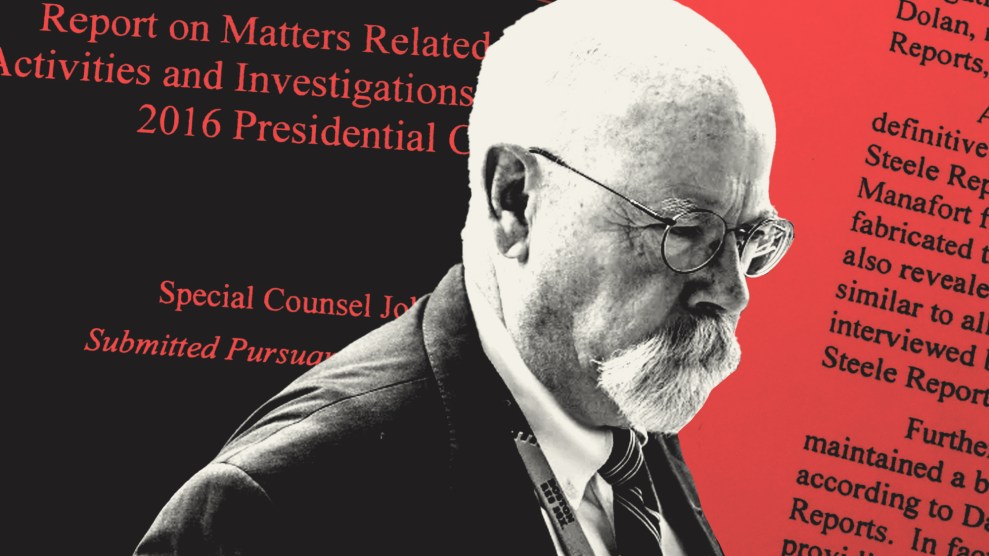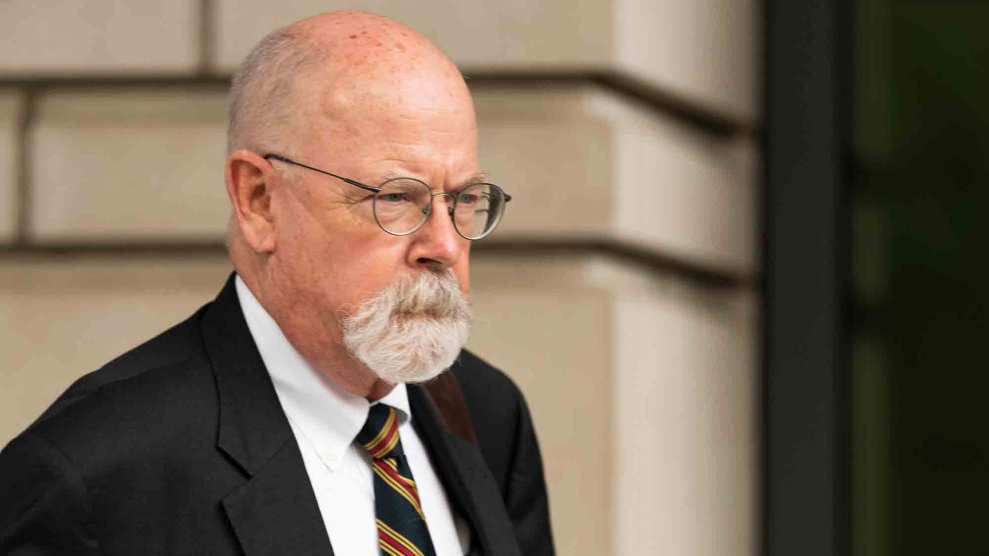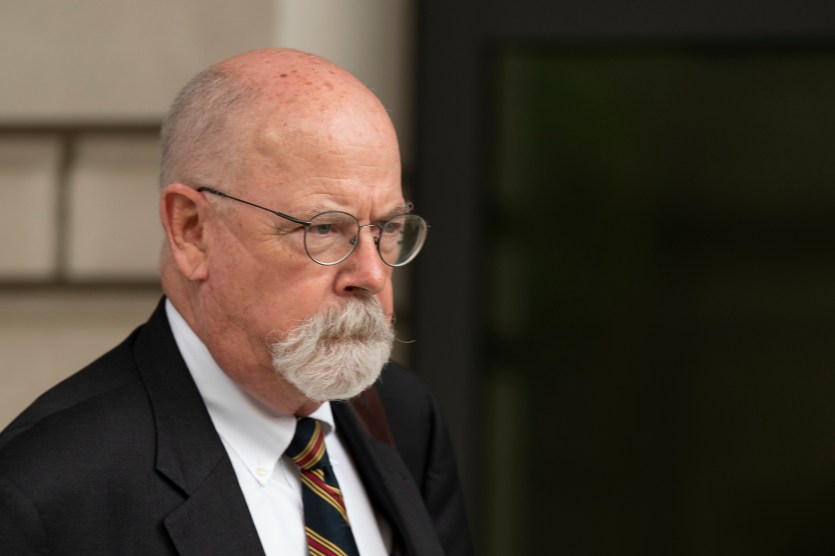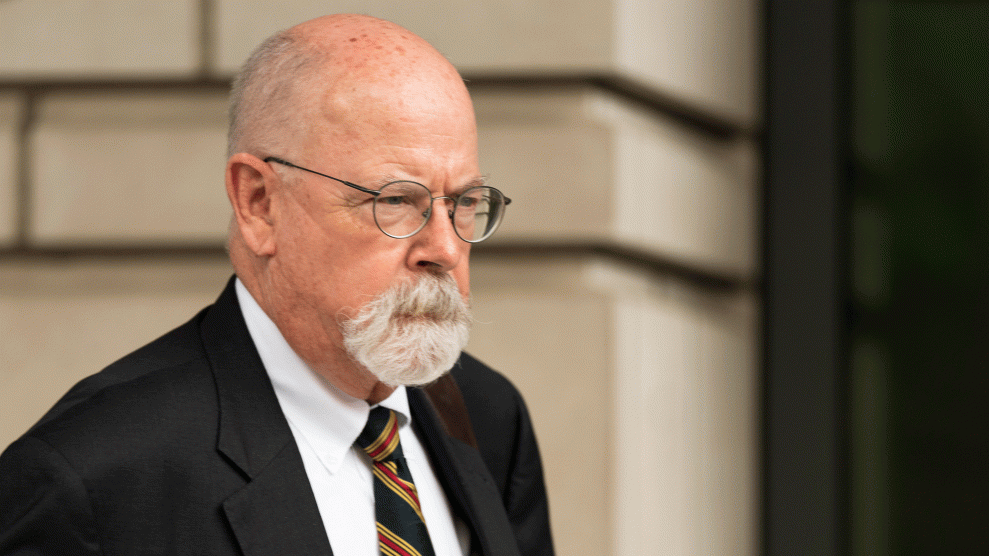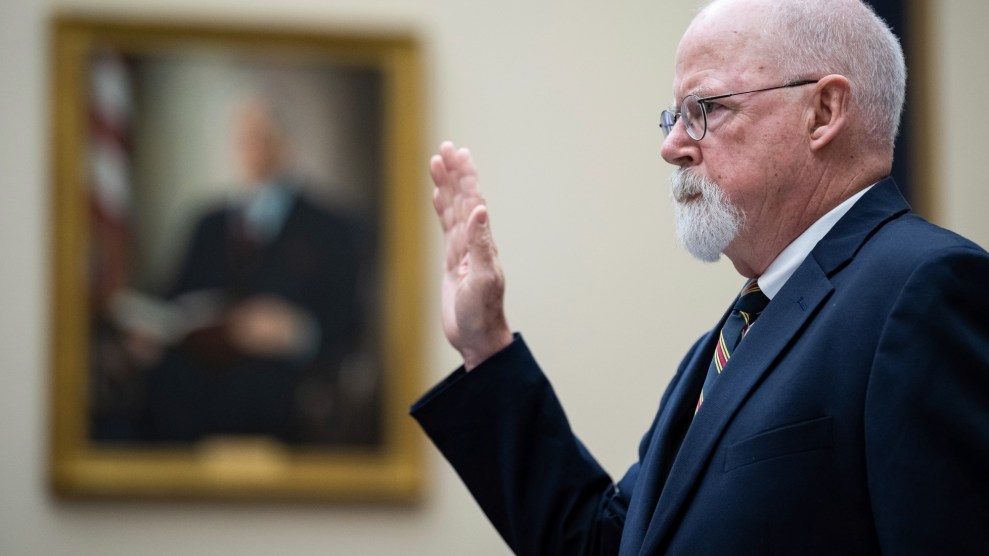
Special counsel John Durham is sworn in during a House Judiciary Committee hearing on the FBI's Trump-Russia investigation.Graeme Sloan/Sipa/AP
John Durham—the special counsel who was appointed by then-Attorney General Bill Barr to investigate the FBI’s investigation of the Trump-Russia scandal and who utterly failed to produce evidence it was a hoax—testified before the House Judiciary Committee on Wednesday. In doing so, he made false statements to Congress. He might even have lied.
Durham spent four years on a crusade that Donald Trump and others hoped would back up Trump’s claim that the Russia investigation was cooked up by his enemies within the supposed Deep State. Yet Durham came up empty on this front, losing two jury trials unrelated to the origins of the FBI’s inquiry and winning a guilty plea from an FBI lawyer who had altered an email to support a surveillance warrant for a former Trump campaign adviser. He prosecuted no FBI officials or Obama administration officials for the supposedly big crime of mounting a plot (or witch hunt!) against Trump. Durham even concluded there was justification for the FBI to have initiated a preliminary investigation, just not a full investigation, of Russia’s attack on the 2016 election and contacts between the Trump campaign and Russia.
When Durham came before the committee, House Republicans eagerly picked over the scraps in his final report, which has been much criticized, and they treated him as a hero. But under questioning from Democratic and Republican members, Durham misrepresented key aspects of the Russia scandal, suggesting he was either unfamiliar with basic facts or was purposefully trying to mislead the committee and the American public.
During his turn to question Durham, Rep. Adam Schiff (D-Calif.) asked Durham about the infamous meeting held in Trump Tower on June 9, 2016, when Donald Trump Jr., Jared Kushner, and Paul Manafort—three of Trump’s top campaign advisers—sat down with an emissary of the Russian government whom they were told had dirt on Hillary Clinton to share. An email sent to Trump Jr. from a business associate that set up this session informed the candidate’s son that this meeting was part of a secret Russian scheme to help Trump’s campaign. Durham dismissed the matter, remarking, “People get phone calls all the time from individuals who claim to have information like that.”
This meeting signaled to Moscow that the Trump camp was receptive to Russian endeavors to intervene in the election to boost Trump’s chances, and Schiff expressed surprise that Durham found it insignificant. “Are you really trying to diminish the importance of what happened here?” he asked.
Durham answered: “The more complete story is that they met, and it was a ruse, and they didn’t talk about Mrs. Clinton.”
That is not true.
The report produced by special counsel Robert Mueller notes that the Russian emissary, a lawyer named Natalia Veselnitskaya, did discuss Clinton: “Participants agreed that Veselnitskaya stated that the Ziff brothers [an American family investment firm] had broken Russian laws and had donated their profits to the DNC or the Clinton Campaign. She asserted that the Ziff brothers had engaged in tax evasion and money laundering in both the United States and Russia.” (There was no evidence that Ziff Brothers Investments had engaged in wrongdoing.)
The Mueller report points out that Trump Jr. zeroed in on this: “Trump Jr. asked follow-up questions about how the alleged payments could be tied specifically to the Clinton Campaign, but Veselnitskaya indicated that she could not trace the money once it entered the United States.” The report quotes a participant in the meeting recalling “that Trump Jr. asked what they [the Russians] have on Clinton.”
Durham’s characterization of the meeting—that it had nothing to do with Clinton—lined up with what the Trump camp first claimed when the meeting was revealed a year afterward, in 2017. At that time, Trump Jr. issued a false statement dictated by his father that insisted the conversation had focused “primarily” on the adoption of Russian children by Americans. That was a phony cover story. Later on, when more information came out, even the elder Trump conceded that the point of the meeting was to gather negative information on Clinton from a foreign adversary. “This was a meeting to get information on an opponent,” Trump said. Yet years later, Durham was still pushing the original disinformation about the meeting propagated by Trump and his allies.
In a subsequent exchange with Rep. Tom McClintock (R-Calif.), Durham misled the committee about another key element of the Trump-Russia scandal. McClintock observed that the “central charge in the Russia collusion hoax was that Trump campaign operatives were in contact with Russian intelligence sources.”
Replying to that remark, Durham said, “There was no such evidence.”
That’s not true.
While running Trump’s campaign in the summer of 2016, Manafort had regular contact with Konstantin Kilimnik, a former Manafort employee in Ukraine who has been repeatedly identified by US government officials as a Russian agent.
In a detailed, bipartisan 2020 report, the Senate Intelligence Committee, then chaired by Republican Sen. Marco Rubio, called Kilimnik “a Russian intelligence officer.” A year earlier, the Mueller report said, “The FBI…assesses that Kilimnik has ties to Russian intelligence.” The US Treasury in 2021 declared Kilimnik was a “known Russian Intelligence Services agent implementing influence operations on their behalf.” The department added, “During the 2016 U.S. presidential election campaign, Kilimnik provided the Russian Intelligence Services with sensitive information on polling and campaign strategy.” In 2018, Mueller indicted Kilimnik on charges of obstruction of justice.
The contacts between Manafort and Kilimnik have been well chronicled by Mueller, the Senate Intelligence Committee, and media reports. Durham should be well-versed in this. Manafort and Kilimnik met secretly in a Manhattan cigar bar. Manafort handed Kilimnik Trump campaign polling data that were to be passed to an oligarch close to Russian leader Vladimir Putin, and he arranged to continue sharing sensitive campaign information through Kilimnik.
Kilimnik also wanted something from Manafort. He asked Manafort to secure Trump’s backing for a Kremlin-approved “peace plan” for Ukraine that would have entailed creating an autonomous zone in eastern Ukraine, a scheme Manafort knew would offer a “’backdoor’ means for Russia to control eastern Ukraine,” according to the Senate report. This sounds like an early attempt to gain Trump’s assistance in securing what Russia later invaded Ukraine to obtain.
The Senate committee also revealed that it had found information, which it did not publicly detail, “suggesting Kilimnik may have been connected to the [Russian] hack and leak operation targeting the 2016 U.S. election.” And it referenced “two pieces of information” that “raise the possibility” that Manafort, too, was connected to Russia’s “hack-and-leak operations.”
The Manafort-Kilimnik connection—which the Senate Intelligence Committee report characterized as a “grave counterintelligence threat“—is one of the most serious and still not fully explained components of the Trump-Russia scandal. It belies all the claims of Trump and his crowd that the Russia investigation was nothing but a hoax orchestrated by a nefarious den of anti-Trump vipers within the law enforcement and national security communities. It is inconceivable that Durham is unaware of this troubling link. But by ignoring the well-documented contacts between Manafort and an identified Russian agent and asserting that there was no evidence of interactions between the Trump campaign and Russian intelligence, Durham was supporting Trump’s never-ending coverup.
Durham’s investigation and report raised several questions about his aims. Was he running a fair and balanced probe or weaponizing a government inquiry to buttress Trump’s self-serving lies about the Russia scandal? Durham’s false statements to Congress about essential facts provide more reason for suspicion, and they further undermine his credibility. They might even merit their own investigation.


